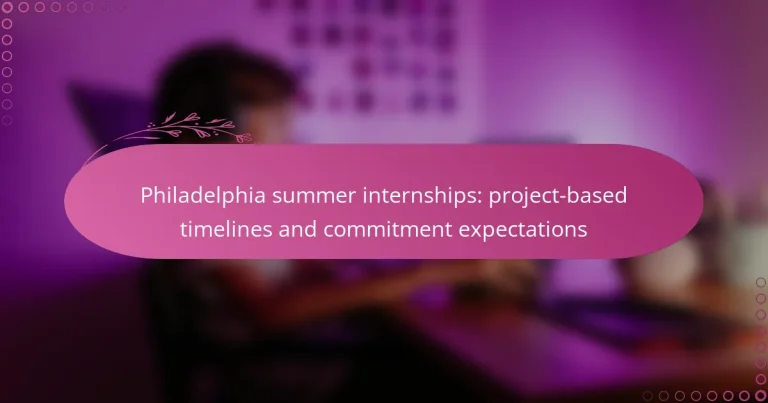

What are the key deadlines for summer internship applications in Philadelphia?
Key deadlines for summer internship applications in Philadelphia typically fall between December and March. Most companies start accepting applications in December. Many deadlines occur in January and February. Some organizations may extend deadlines into March. Specific deadlines vary by industry and company. For example, finance and tech firms often have earlier deadlines. Non-profit organizations may have more flexible timelines. Always check individual company websites for precise dates.
How do application deadlines vary across different organizations?
Application deadlines vary significantly across different organizations. Each organization sets its own timeline based on internal policies and program structures. For example, some universities may have deadlines as early as December for summer internships, while private companies might accept applications until March or April. Non-profit organizations often have varied deadlines, sometimes aligning with academic calendars. Government internships may also differ, often requiring applications several months in advance. According to a survey by the National Association of Colleges and Employers, 45% of employers reported that they finalize summer internship hiring by March. Thus, understanding the specific deadlines for each organization is crucial for applicants.
What are the typical deadlines for large corporations?
Large corporations typically set application deadlines for summer internships between early November and mid-January. This timeframe allows for sufficient review and selection of candidates. Many corporations announce internship positions in the fall. They often require applications to be submitted by late December or early January. Some companies may have rolling deadlines, while others stick to fixed dates. Interns are usually selected by late January or early February. This schedule aligns with academic calendars for students. Timely applications increase the chances of securing an internship position.
How do deadlines differ for non-profits and startups?
Non-profits and startups have distinct approaches to deadlines. Non-profits often work with fixed timelines due to grant cycles and funding requirements. These deadlines are typically set well in advance and are crucial for securing resources. Startups, on the other hand, tend to have more flexible deadlines. Their timelines can shift based on market conditions and product development needs.
Non-profits may prioritize deadlines that align with community needs and funding opportunities. This can lead to a structured approach to project planning. Startups often embrace agility, allowing them to adapt quickly to changing circumstances.
Research shows that non-profits face pressure to meet deadlines for reporting to funders, while startups may focus on deadlines that drive growth and innovation. This difference highlights the contrasting operational frameworks of these entities.
Why is it important to track deadlines for summer internships?
Tracking deadlines for summer internships is crucial for securing opportunities. Missing a deadline can result in disqualification from the application process. Many internships have specific timelines for submission, interviews, and decisions. According to a survey by the National Association of Colleges and Employers, 63% of employers expect students to meet deadlines. Additionally, timely applications demonstrate professionalism and organizational skills. Keeping track of deadlines ensures that candidates can prepare strong applications. It also allows for effective follow-up after submission. Overall, tracking deadlines is essential for maximizing chances of success in internship applications.
What are the consequences of missing application deadlines?
Missing application deadlines can lead to disqualification from internship opportunities. Applicants may forfeit their chance to be considered for positions. This can result in limited career advancement options. Additionally, missing deadlines can harm an applicant’s reputation. Future applications may be viewed less favorably. Some organizations may not accept late submissions under any circumstances. This strict adherence to deadlines ensures fairness among all applicants. Therefore, timely submission is crucial for success in internship applications.
How can timely applications improve internship prospects?
Timely applications significantly enhance internship prospects. Submitting applications before deadlines demonstrates professionalism and enthusiasm. Many organizations prioritize early applicants in their selection process. Research shows that candidates who apply early have a higher chance of securing interviews. For instance, a study by the National Association of Colleges and Employers found that early applicants are often viewed more favorably. Additionally, timely submissions allow candidates to be considered for limited positions. This can lead to increased opportunities and less competition. Therefore, meeting application deadlines is crucial for improving internship chances.

What timelines should applicants follow for summer internships in Philadelphia?
Applicants for summer internships in Philadelphia should begin their search and application process at least six months in advance. This means starting in the fall, typically around September or October. Many companies post internship opportunities during this period. Applicants should aim to submit their applications by late November or early December. This timeline allows time for interviews, which often occur in January and February. Final decisions are usually made by March, with internships starting in late May or early June. Following this timeline increases the chances of securing a position.
How can applicants create a timeline for their application process?
Applicants can create a timeline for their application process by outlining key dates and tasks. Start by identifying the application deadline for the internship. Next, break down the process into manageable steps such as researching internships, preparing application materials, and scheduling interviews. Assign specific dates to each task leading up to the deadline. For example, allocate time for resume updates and gathering references. Utilize a calendar or project management tool to visualize the timeline. Regularly review and adjust the timeline as needed to stay on track. This structured approach helps ensure that all components of the application are completed on time.
What key milestones should be included in the internship application timeline?
Key milestones in the internship application timeline include researching opportunities, preparing application materials, and submitting applications. Researching should occur at least two months prior to deadlines. Preparing materials, like resumes and cover letters, should take about three weeks. Submissions should be completed by the application deadline. Following up with applications can happen one to two weeks after submission. Interviews typically occur within four to six weeks after applications are submitted. Final decisions are often communicated within a month after interviews. Accepting offers should be done promptly, usually within a week of receiving an offer.
How can applicants allocate time for researching internship opportunities?
Applicants can allocate time for researching internship opportunities by creating a structured schedule. First, they should identify specific time blocks dedicated to research. For instance, setting aside 2-3 hours each week can provide a focused approach. Next, they can utilize online resources such as internship databases and company websites during these blocks. Additionally, applicants should prioritize their research based on application deadlines. This ensures they focus on opportunities with imminent deadlines first. Regularly reviewing and updating their list of potential internships can also enhance efficiency. By maintaining a calendar, applicants can track research progress and upcoming deadlines effectively.
What are the stages of the internship application process?
The stages of the internship application process typically include several key steps. First, candidates identify potential internship opportunities. They often use job boards, company websites, or networking events. Next, candidates prepare application materials. This usually involves crafting a resume and writing a cover letter tailored to each position.
After preparing materials, candidates submit their applications. This can be done online or via email, depending on the employer’s requirements. Following submission, candidates may undergo an interview process. This can include phone interviews, video interviews, or in-person meetings.
Once interviews are completed, candidates await decisions from employers. This stage can vary in duration, depending on the company. If selected, candidates receive an offer letter, which outlines the terms of the internship. Finally, candidates may need to complete onboarding tasks before starting their internship.
What steps should be taken before submitting an application?
Research the internship requirements thoroughly. Understand the qualifications needed for the position. Gather all necessary documents, such as a resume and cover letter. Tailor your resume to highlight relevant skills and experiences. Write a compelling cover letter that addresses the internship’s specific requirements. Proofread all materials for errors and clarity. Ensure you meet the application deadline set by the organization. Follow any specific submission guidelines provided by the internship program.
How can applicants prepare for interviews after submitting applications?
Applicants can prepare for interviews after submitting applications by researching the company and role. Understanding the organization’s mission and values is critical. Reviewing the job description helps identify key skills and responsibilities. Practicing common interview questions builds confidence. Engaging in mock interviews with friends or mentors provides constructive feedback. Preparing thoughtful questions for the interviewer demonstrates interest. Dressing appropriately for the interview reflects professionalism. Finally, following up with a thank-you note after the interview shows appreciation. These steps enhance applicants’ readiness and improve their chances of success.

What resources are available to help applicants with deadlines and timelines?
Applicants can access various resources to assist with deadlines and timelines for Philadelphia summer internships. These resources include official internship websites, which provide detailed application timelines. Local universities often have career services that offer workshops on application processes. Online platforms like Handshake and LinkedIn also list internship deadlines and timelines. Additionally, organizations may distribute newsletters with important dates. Social media channels can offer real-time updates on application deadlines. Networking events can provide insights from previous interns about timeline management. These resources collectively support applicants in staying informed and organized throughout the application process.
How can online tools assist in managing internship applications?
Online tools can streamline the management of internship applications. They provide centralized platforms for tracking deadlines and submissions. Applicants can receive notifications for upcoming due dates. Tools often include features for organizing application materials. This helps ensure all documents are submitted on time. Many tools also offer collaborative features for sharing progress with mentors. Data analytics can identify trends in application success rates. These capabilities enhance the overall efficiency of the application process.
What are some recommended apps or websites for tracking deadlines?
Trello, Asana, and Todoist are recommended apps for tracking deadlines. Trello uses boards to visualize tasks and deadlines. Asana allows users to create projects and set due dates. Todoist offers a simple interface for task management with deadline reminders. Google Calendar is a popular website for scheduling and deadline tracking. It integrates with other apps for seamless organization. These tools enhance productivity and ensure deadlines are met effectively.
How can social media platforms provide updates on internship opportunities?
Social media platforms can provide updates on internship opportunities through posts, stories, and live sessions. These updates can include application deadlines, program details, and eligibility criteria. Many organizations utilize platforms like LinkedIn, Twitter, and Facebook to reach a wider audience. For instance, companies often share internship announcements on their official pages. They may also engage with followers by responding to inquiries in real time. Additionally, hashtags related to internships can help users discover relevant opportunities. Research shows that 79% of job seekers use social media to find job openings. This highlights the effectiveness of social media in disseminating internship information.
What best practices should applicants follow regarding deadlines and timelines?
Applicants should prioritize understanding and adhering to all deadlines and timelines associated with summer internship applications. They must carefully review application materials for specific due dates. Creating a timeline that includes all relevant deadlines is essential. This timeline should account for submission dates, recommendation letter deadlines, and interview schedules. Applicants should set personal deadlines ahead of official ones to allow for unexpected issues. Regularly checking the internship program’s website can provide updates on any changes to deadlines. Additionally, reaching out to program coordinators for clarification on timelines is advisable. These practices enhance organization and improve the chances of successful application submission.
How can applicants ensure they stay organized throughout the process?
Applicants can ensure they stay organized throughout the process by creating a detailed timeline. This timeline should outline all application deadlines and required materials. Applicants can use digital tools like calendars or project management apps to track tasks. Setting reminders for each deadline can help maintain focus. Additionally, keeping all application documents in a dedicated folder simplifies access. Regularly reviewing progress against the timeline allows for adjustments as necessary. Research shows that structured planning increases application success rates.
What tips can help applicants avoid last-minute rushes for applications?
Applicants can avoid last-minute rushes for applications by starting early. Early preparation allows for thorough research on requirements. Creating a timeline with key dates helps in managing tasks. Setting personal deadlines ahead of official ones ensures ample time for revisions. Regularly checking application statuses prevents surprises close to deadlines. Organizing documents in advance streamlines the submission process. Seeking feedback from peers or mentors early improves application quality. Lastly, maintaining a checklist of required materials ensures nothing is overlooked.
The main entity of this article is the deadlines and timelines for summer internship applications in Philadelphia. The article outlines key application deadlines, which typically range from December to March, and highlights variations across different organizations, including large corporations, non-profits, and startups. It emphasizes the importance of tracking these deadlines to avoid disqualification and improve application prospects. Additionally, the article provides guidance on creating a structured timeline for the application process and resources available to assist applicants in managing their applications effectively.






